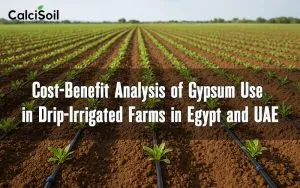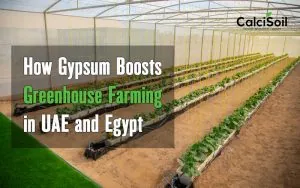
Top 5 Agricultural Gypsum Advantages That Makes It Farmer’s Best Friend
Are you looking for a vital mineral for your agricultural field? If yes then there’s no doubt that farmers are using this essential mineral for the centuries; however, it is in recent years that it has gained much attention all over the world. The ongoing research and practical understandings for Agricultural Gypsum have made it a socio-economical friend for farmers.
Gypsum or Calcium Sulphate Dihydrate (CaSO4. 2H2O) is considered as the best source of sulfur and calcium for crops for better and healthy yields. On one hand, where gypsum mineral for agricultural grade helps to cut down phosphorous movement from fertile soils to streams and lakes, on the other hand, it helps in better absorption of water and decreases soil erosion. This enhances the quality of vegetables and fruits.
Agricultural Gypsum Advantages
1. Abundant Source of Calcium and Sulfur
For the adequate growth of the plant, calcium intake for the plant is a must. Being a rich source of Calcium, Agricultural Gypsum supplies this essential mineral to the roots. The mineral thus helps in stimulating the growth of the plants’ roots. In the absence of the sufficient calcium, the mineral uptake mechanism of the plant will not be functional.
2. Enhances Acid Soils’ Quality and Reduces Toxicity of Aluminum
Agriculture grade gypsum has a unique quality to decrease the toxicity of aluminum that is often present in toxic soils, especially in subsoils. The surface application of gypsum flows down to the subsoil, deep in roots. This results in increased and enhanced growth of plants’ roots.
3. Proper Application Enhances Soil Structure
As managing NPK is important for plant growth, managing the calcium-magnesium ratio is equally important too. Soluble calcium present in gypsum used for agriculture supplies this vital mineral. It helps in overcoming dispersion effects and promoting flocculation that is required to provide satisfactory soil structure for air & water movement and root growth.
4. Enhances Water Infiltration & Improves Soil-Water Relations
Gypsum enhances soil ability to drain soil and prevent waterlogging due to the presence of swelling clay, high sodium and excessive water. When this mineral is applied, it lets water move into the soil, allowing crops to grow properly. During drought, improved water-use efficiency of the crop is very much essential as it captures water when raining. When gypsum is applied, it imparts an advantage for soil-water relations, thus, supporting the good soil structure.
5. Supplies Sufficient Phosphorous & Reduces Soil Erosion
Agricultural gypsum application to crops is considered as one of the best agricultural practices to reduce soluble phosphorous lose. When applied, it keeps phosphorous & other essential nutrients from leaving the field.
Therefore, regular use of the Agricultural Gypsum is vital for the sustainability of most wet soils.







